Even if you have a brilliant user experience and a killer website design, if your website isn’t appearing at the top of Google for your target phrases and keywords, then you will never get enough return from your digital marketing spend.
If you really want to stand out from your competitors, then you need some awesome strategies for building backlinks to your website. In this article, I’ll share some very effective methods I’ve had success doing myself.
Google is constantly working on their algorithm so as well as being aware of what works for them and what doesn’t, you need to play by their rules too. Things like keyword stuffing and link farms won’t work in your favour anymore. Instead, you need to focus on getting links from quality sites that provide value rather than quantity.
In this guide, I will take you through all the main steps of link building, starting with why it’s important, the importance of quality content and then we’ll jump into some great strategies for getting backlinks.
What is backlink building?
Link building is the process of acquiring backlinks to your website from other high-quality websites. Link building is an essential aspect of digital marketing. By developing and acquiring links to your site, you are essentially helping your website get better search engine rankings, and encourage search engines to rank your content well.
Put it another way, backlinks are similar to a vote. By adding a link to your website from mine, I am stating that your website is worthy of a link, and therefore the amount of backlinks are an important indicator of a website’s level of authority. This has a huge impact on their ranking in search engine results pages (SERPs).
Why is link building important?
Your job as a website or blog owner doesn’t end just after hitting publish. There is much more to do even after that. Among the list of required things to do, the process to build links to your business blog is quite important. Once you have posted the blog, it is very important to make sure people are able to find your blog in the first place.
No matter how good your website or a blog you have written, if no one can find it, it will not give you better returns. In order to help you in this regard, we have put together a list. Building links to your business website in it the right way matters a lot because only quality links count in this process.
If you take a look at the 200 ranking factors of Google, you will find the links as one of the most important. All you need to know is every quality link counts. That is why almost everyone is hungry for links. Thinking out of the box, in this case, will be highly helpful.
Link building is important for many reasons. First and foremost, links are one of the main ways that Google determines the legitimacy of a website. A website with a ton of low-quality links will be considered a spammy site and may not rank as high as the website with a small handful of high-quality links.
Backlinks are also an indicator of how successful your website has been. This is important for a few reasons. First, it shows Google how many people have found your site and wanted to link to it. Second, it shows Google how much you’ve been able to get people to link to your site for you.
Relevance is the key
Talking about relevance becomes highly important here. Relevance in this field has no fixed and perfect definition. The degree up to which your product matches the demands of your audiences is termed as relevance. And the demands of the audiences depend solely on them and keep on changing. Once you are able to find your target audience perfectly, you can start with relevance very easily.
Some people like to engage in trending topics while there are others who focus more on research quality content. It all depends on the type of audience you are chasing. Make sure you are creating accurate and authentic content for their needs and demands.
Create fantastic content
Link building is a very important part of search engine optimisation, sure, however I have to say that the most important of all the various strategies for building backlinks to your website, is the quality of your content.
No matter how much effort or money that you spend in building links, if your content is average, you’ll fail. Your content needs to be fantastic. If you want to churn out AI written garbage articles in bulk, don’t expect anyone to link to them. If you spend hours and hours writing greatr stuff, and getting fantastic visuals, etc there’s a much better chance people will just start linking to it.
Powerful backlink building strategies
Now that we know all about why link building is important, let’s go through some proven strategies for building backlinks to your website. I have personally tried all of these, and know how well they can work if you put in the effort.
I will cover 14 strategies. Each of these have different effort required, and different results. As all of our audiences are different, it is up to you to try them out, and work out which are the most effective to you. The strategies I will cover, are;
- Guest posting
- Unlinked mentions
- Publish research
- Recover lost links
- Copy your competitors
- Get media coverage
- Broken links
- ‘Best of’ and ‘tools’ lists
- Communities
- Amazing content
- Expert roundups
- Niche directories
- Write testimonials
- Find content gaps
- Ask connections
- Help others
As with most of my lengthy guides, you can jump straight to the strategy by clicking the link above, however I always recommend for at least the first time, you read this guide from start to end. Now, let’s get into each of these killer strategies for building backlinks to your website.
Guest posting
One of the best strategies for building backlinks to your website is through writing and pitching guest posts. I won’t cover this strategy in too much detail, as I have previously written plenty on guest posting and the benefits of writing guest blogs, however a quick recap.
Guest posting is an extremely popular method for getting backlinks. As you already know, your main goal should be to get quality backlinks, and having your content published on reputable sites is a fantastic way to do that.
There are a few things you can do about that:
- Create unique and relevant pieces of content. The combination of these two qualities ensures the success of your content among the audience.
- The content based on the precise needs of audiences works the best. So, having a proper idea about your target audience is a prerequisite.
Your main target here is to reach the best sites for pitching your guest post content. And you will be able to do it if the publishers find some value in your content. There is no other way.
Check out my little side project which lists over 2,000 sites that accept guest posts to start with.

Unlinked mentions
Using Google, or tools like Ahrefs, you can uncover mentions of your brand or product names that are not linked to your website.
For example, using Content Explorer in Ahrefs, I was able to find over 21,000 pages that feature the brand name, MYOB, yet do not have a link to myob.com on the same page.
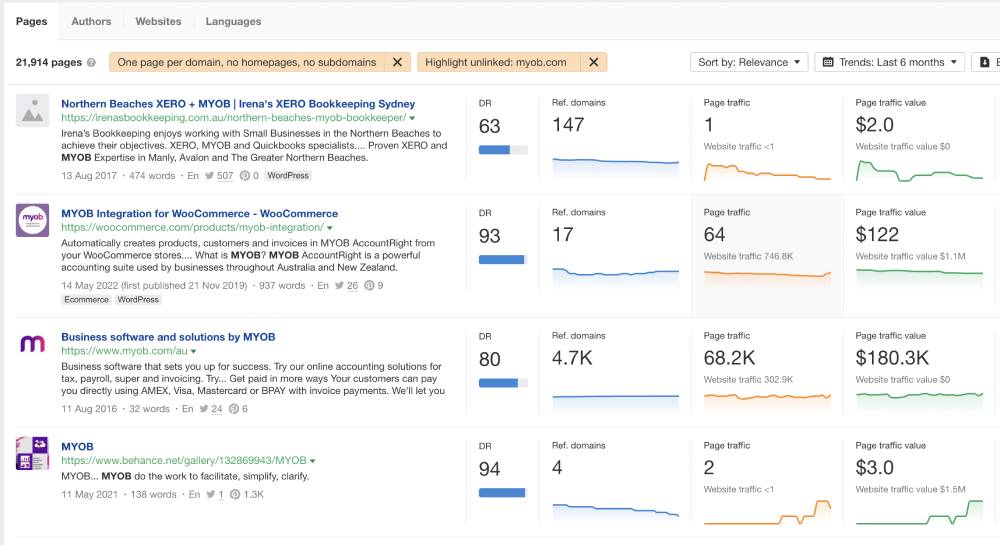
I could export this list as a CSV, and then work steadily through the list, and find the contact details for each website, and send them a polite email, such as the one I received a while back, shown below.
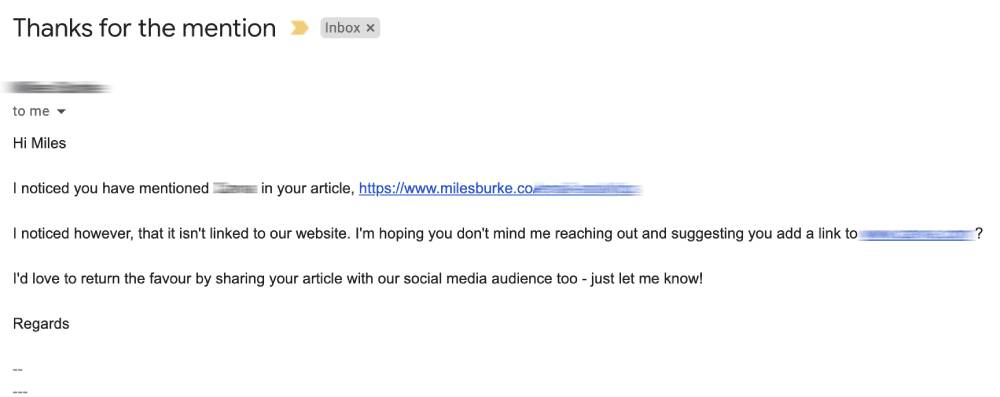
It is very likely that the website owner or author is already a fan of your product or brand, since they mentioned it. Therefore it shouldn’t be too much of a hard sell to get them to link your brand name to your website. You just need to reach out nicely and ask.
This example, they mention mentioning the article on their social media following too, which is a good thing to offer (especially given it mentions them as well!).

Publish research
Think about it; you’ll find that content resulting from research is usually the most desirable for unsolicited backlinks. You have no doubt linked to it before, yourself.
Your content builds authority in this information only if your content is backed by data. Data is obtained from research and analysis.

Several experts emphasise the importance of statistics and data for making your blog linkable. A way to build that data is through running surveys or asking a market research company to do the surveying.
Another option is to crunch all the recent data from research in the last few years, and present it as an alternative larger research study. By doing so, you are able to provide value to your audiences with the help of this new data.
These research and survey practices are known to be highly helpful in getting quality backlinks.

Recover lost links
It is just a natural fact that as we all gain links to our websites, over time we all lose some links as well. One of the lesser used strategies for building backlinks to your website is by keeping an eye on your existing links, and asking for them back.
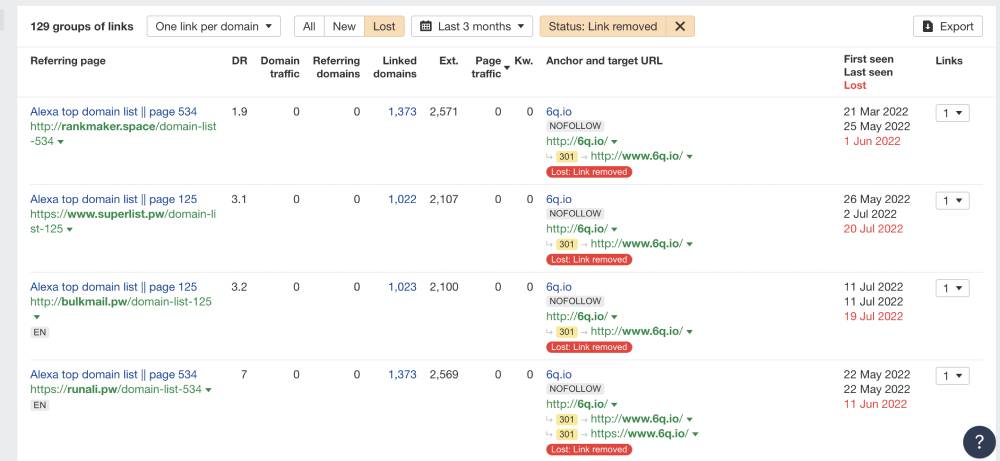
There are times, of course, where it is natural for your links to disappear. This could be other sites displaying recent RSS feeds, or from data, such as the screen capture above which shows Alexa data for a specific date period. Then there are websites that get closed down, or old articles that get deleted and the like.
However there are other times, where a blog author or website owner may just decide to remove your link.
There’s a number of reasons why this may happen – one of the main ones is they feel your content is out of date, or not enough any more. This is why it is important to regularly update your old content, to ensure it stays fresh.
By reaching out to them and mentioning that you noticed the link was removed, and allows you an opportunity to find out why they removed it, and see if there is a way to rectify it. For example, if they feel that page they linked to was out of date, you could assure them that you’ll update it.

Copy your competitors
Chasing your competitors backlinks is a solid strategy and bound to work, given that these websites already link to your competitors. In the below example, I have used three real estate websites, and my own blog.
Pretend for a moment my blog is a real estate agency. You want to find links to any of those three, and see if there’s an opportunity for you to request a link too.
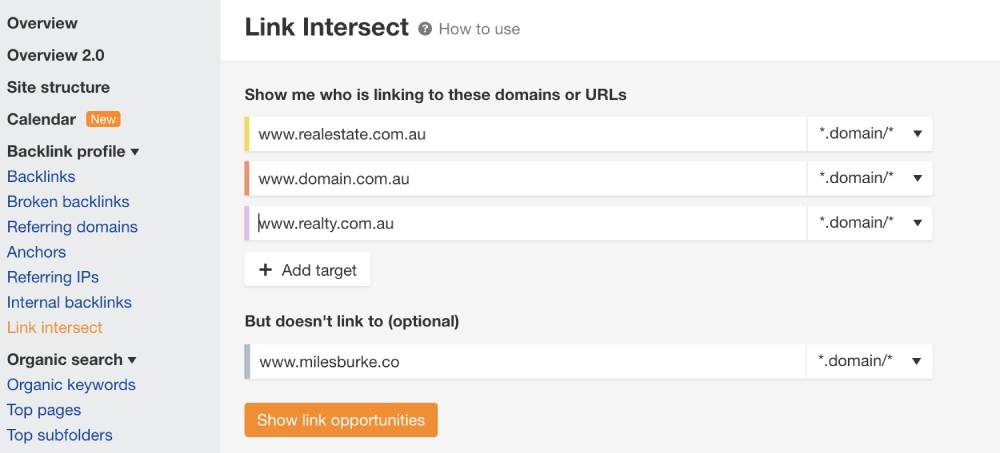
Using the Link intersect in Ahrefs, I entered the three websites and my own, and I found over 85,000 websites that link to my three real estate competitors, but not to my website.
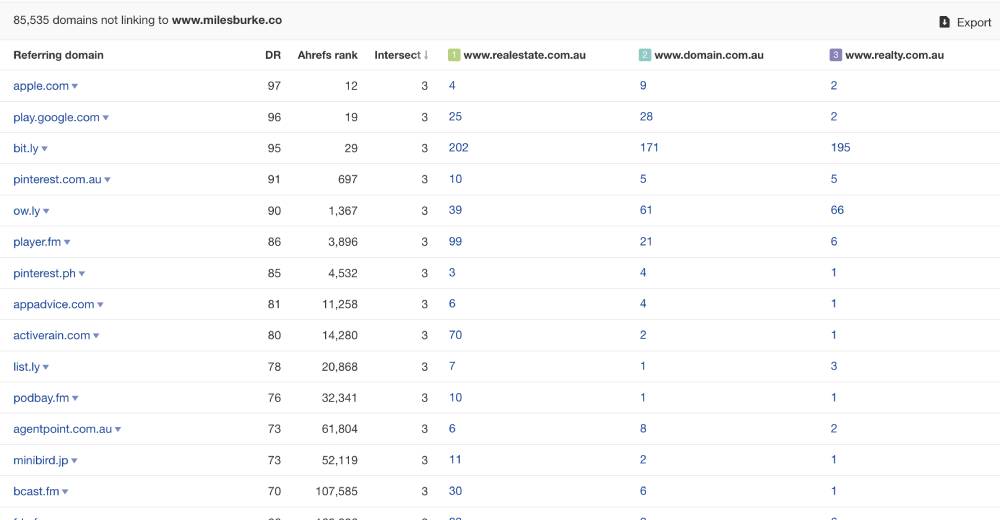
I can now filter and export that list of backlink prospects, and start sorting the resulting spreadsheet by domain rating, website traffic and more. Once I have a target prospecting list (hopefully not all 85,000 websites!), I can then start my email outreach to the website owners and editors.
I would personally start with websites that link to all three of my competitors, and have reasonable traffic and a domain rating (DR) of above 20 to start with.
Imagine if I managed to get just 5% of those 85,000 backlinks to point to my website? It would be an insane boost to my online presence, and search engine optimisation activities.

Get media coverage
I remember the first time my excitement when a project I was working on received major newspaper coverage. We sat there refreshing Google Analytics, waiting for the traffic to come in. Nada, zero, yawn. If you get mentioned in offline media, it will barely move your traffic needle.
That’s not to say the same applies online. I had a project that was shared and mentioned by Mark Cuban, of Shark Tank fame. It included an article I had written for an online media site, which featured my link in the author bio. Tens of thousands of people clicked that link over the coming weeks.
That’s the difference between online and offline media for your website traffic.
So, how do you get mentioned in the media? There’s a few different approached that have worked for me and teams I have consulted with in the past.
Riding the current affairs wave
Let’s say you are developing an employee engagement tool. You see some large Fortune 500 company is being slammed for handing out $20 gift vouchers to employees who have been with them longer than a decade.
You know from previous research that small things like this barely engage employees, so now’s the time to send our a note to all the media covering this story with your own “expert perspective”.
Publishing great research
Another method is rolling up your sleeves and doing some serious research and publishing the results. As I mention in the “Publish research” section above, however the difference here is sending an email or making a call to all the reporters who have covered similar research previously.
Press release distribution
First step here is ensuring what you are announcing is actually newsworthy. You may think that your new product release should be on everyone’s front of mind, but should it really be? What’s so newsworthy? You often need to dig deep to find the angle. Is there something about what you are announcing that is unique?
To make a press release more newsworthy, start by focusing on a compelling headline and lead paragraph. The headline should grab attention and clearly convey the main message or significance of the release. The lead paragraph needs to provide a strong hook that highlights the newsworthiness, answering the who, what, when, where, why, and how in a concise and engaging manner. A captivating start will entice journalists and readers to delve deeper into the details.
Another essential aspect is to emphasise relevance and impact. Tailor the press release to demonstrate how the news directly affects the target audience.
This could involve highlighting local angles, drawing connexions to current trends or events, or showcasing the broader implications of the announcement. Including quotes from key stakeholders or experts can add credibility and human interest, making the story more relatable and significant.
Finally, ensure that the press release is well organised and provides comprehensive, valuable information. Use clear, concise language and avoid jargon. Include relevant data, statistics, and any supporting visuals that can enhance the narrative.
Providing easy access to additional resources, such as links to websites, press kits, or contact information for further inquiries, can also make the press release more attractive to journalists. A well-crafted, informative, and relevant press release stands a better chance of being picked up and covered by media outlets.

Broken links
Broken or dead links are the ones that don’t lead to any website. One of the more advanced strategies for building backlinks to your website is for you to find such links and suggest your website to tie up those loose ends.
The below email is one I received recently, which does a great job of being helpful whilst requesting a link.
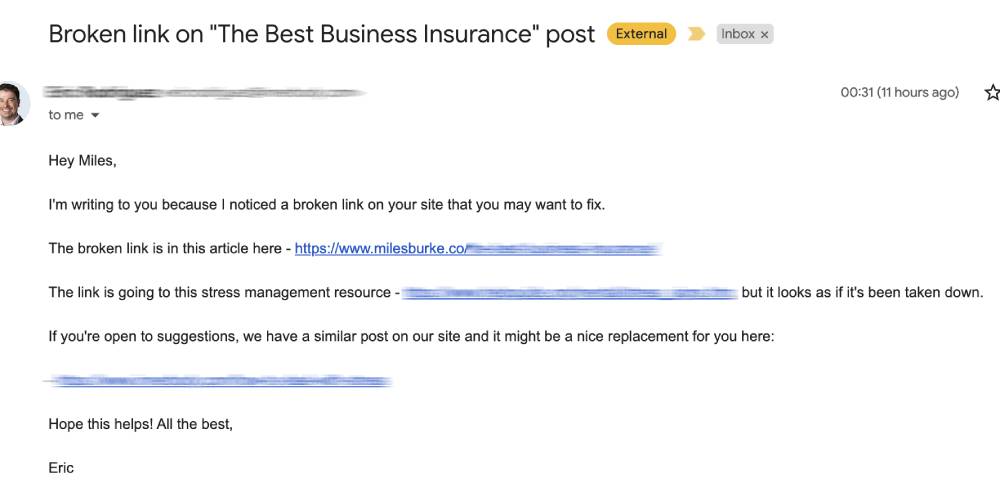
You can find these links easily by using Ahrefs, and going to the popular digital marketing links and then searching for broken links. Once you have found the digital marketing links, use a broken link checker to find broken links.
After you have found those links, reach the site owner in an authentic way and suggest your website replacement. Obviously, it is solely the choice of the website owner, so you can’t force or order them to do it, but simply request. A nice way to suggest returning the favour is through sharing their post on your social media channels and the like.

‘Best of’ and ‘tools’ lists
Being on a “best of” list is of course a big endorsement of your product or service, but it also helps you in getting links to your website from these relevant authoritative websites.
To find these, you can either Google or use Ahrefs to search “best [topic] tools” or “top XX [topic] brands” to find a list of suitable targets to approach with your email outreach for a backlink.
Alternatively, you can also check your competitor’s backlinks, paying special attention to do follow backlinks with titles including the words “best” or “top”.
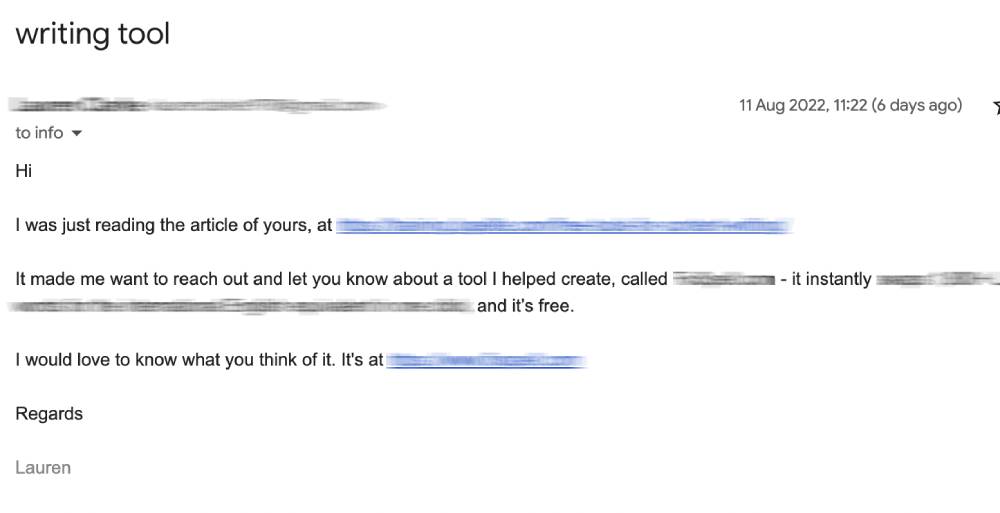
You can contact the author or site owner and ask about getting added to the list. It may be a paid placement, or it may be at the editor’s discretion, however if you provide a compelling reason, it may be placed there to keep your content fresh.

Communities
Approached well, communities such as quality online forums, LinkedIn and Facebook groups and Q&A sites such as Quora, can be a great place to share links to your content, but only with plenty of caution. Many of these groups have an outright ban on any self promotion, or they, as expected, have a dim view of people just joining, posting links and running.
The trick here is to always give more than you take. That is, post at least twice as often with no self promotion or links to your content, as posts that you do.
Imagine you’ve got content about opening a pizza business. You can use Google to search for a term, such as;
“Pizza business” site:quora.com
This will give you a list of questions on Quora about the pizza business. Then, clicking through to the site, you can judge the popularity of the question by how many followers, answers and upvotes it has.
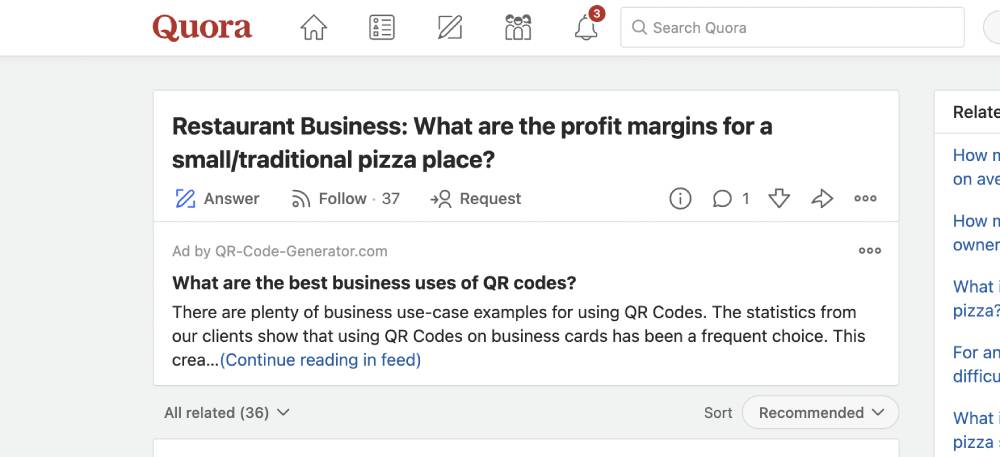
You could then personalise a good response to the question, add the main points from your article, and finally sign off with a link to your post on the subject.

Amazing content
I mentioned at the start of this guide that the best strategies for building backlinks to your website is always be writing and publishing fantastic content. This is taking it one step further though, and creating amazing content that is way better than any other article on the same topic.
Here are the steps you should take. Let’s say you want to write a guide to opening a pizza shop in Australia. First thing you should do is take note of the first 5-10 articles that are ranked on Google for common search queries that you wish to target.
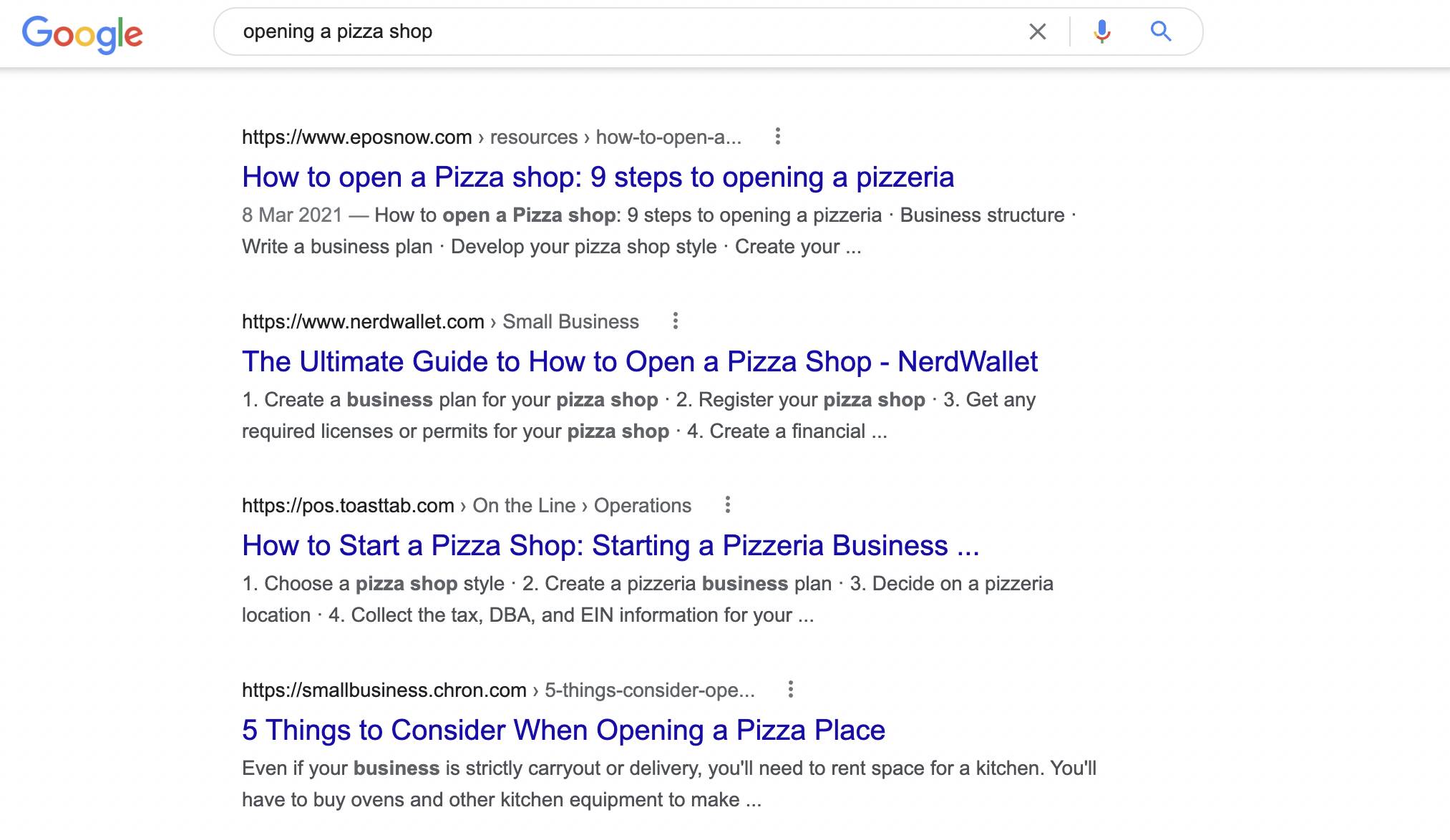
Write down their URL’s and titles, and then break down their sub headings. For example, one of the highest ranking articles may have subheadings, such as;
- Build your pizzeria menu
- Find your pizzeria inventory supplier
- Craft your pizzeria design and atmosphere
- Hire your pizzeria team and management
And another competing article has sub headings or sections named like;
- Write a business plan
- Develop your pizza shop style
- Create your pizza menu
- Choose the right location
What you want to do is combine these all into one single list, and look for topics or information they haven’t covered, which you could create as well. Then, write about each of these topics (using your own sub headings – not the ones you’ve copied) and expand it into a bigger guide.
You could have graphics or illustrations created to support your content, and even get some photos taken if possible (you could do this yourself by visiting local pizza stores with a camera).
The end result should be something that is far better than any of the top ranked articles on the same subject, which helps answer your ideal target customer questions better, and informs them further than the other articles in the search results.
Over time, your article will attract more readers and backlinks, as people find it and the article starts to work its way up the search results.

Expert roundups
Another great way to earn a backlink is to be included in an ‘expert roundup’ kind of post. Here’s an example of one. The influencers have got to a whole new level because of their relationship with their audience on a wide scale. This is the main reason behind reaching them.

The above screen capture is from an article I helped with, over on the Stockphoto.com blog. The 18 photographers were approached by email, and asked to complete a simple Google Forms survey. The results were collated and published, and then all 18 contributors were told of the article. Naturally, most of them went on to share it across their social media and websites as well.
The trick to finding the right people to approach for your expert roundup posts, is by checking on their social media audience size and/or their SEO presence. For example, if I search ‘stock photographer’ on Twitter, I can look at how many people follow each of the accounts, and approach the larger ones first to take part.
Once you publish a roundup post which includes someone significant in your category, you are simply cutting down on your efforts to reach your target audience. You can sit back and watch them share a link to your post to their followers. Heck, I’ve done that many times myself.
Alternatively, you can find expert roundups for you to contribute to, by using sites like Source Bottle and Terkel. These posts go both ways. The more exposure you can get by appearing on other blogs expert roundups, the better as well.

Niche directories
It may seem like web directories are so last decade, however the quality, niche ones still are relevant for building citations using the NAP principle (Name, Address and Phone Number).
Getting listed on web directories that are very relevant, such as your industry or your geography, may not make a huge difference, but they are fairly low effort as well.
There’s a list of Australian web directories there and plenty of others can be found through searching phrases, such as “[your city or state] websites” or “[your industry] directory”.
Getting listed on niche directories offers several distinct advantages for businesses and professionals aiming to stand out in their specific industry. First, niche directories provide targeted visibility. Unlike general directories, which cater to a broad audience, niche directories typically focus on a specific market segment. For example, they tend to be geographic, such as “businesses in Western Australia” or they only cater for specific industries such as “All Pizza businesses”.
This means that your listing will be seen by people who are genuinely interested in your industry or services, resulting in higher quality leads and a better chance of conversion. For example, a local organic farmer listing their products on a sustainable agriculture directory will attract customers who are specifically looking for organic produce.
Another significant benefit is enhanced credibility and trust. Being listed in a reputable niche directory can serve as a form of endorsement, signalling to potential customers that your business is a trusted and recognised player in your field.
Many niche directories have stringent criteria for listings, which helps to maintain high standards and ensures that only quality businesses are featured. This can help to build your brand’s reputation and increase customer confidence in your products or services.

Find content gaps
Finding content gaps is a really effective way, yet quite underrated if you want to build links to your website. The biggest downfall here is that content work such as this takes time to pay off, and isn’t as quick as some of the other strategies for building backlinks to your website as I have listed here.
The best way to go about finding content gaps is by looking at your search engine ranking competitors. Focus on reading many page titles and article headlines, and look for topics or things that are lacking in their content.
It might be possible that say most competitors have talked about opening a pizza restaurant, but haven’t discussed the pros and cons of going with a franchise system instead of an independent brand. You may wish to write a lengthy guide on the differences between these two pizza shop elements, and this is what we call the process of filling the content gap.
Once you’ve found a few this way, you will soon learn that you can find a lot of opportunities to reach your target audiences through this method.

Write testimonials
Everyone in business wants great testimonials. Why not approach the companies you regularly buy from, such as SaaS companies, product wholesalers and the like, and offer to write them a testimonial?
Most of the time, these websites then publish it, and link to your business website.

Ask connections
Everyone in business has connections with suppliers, customers, local business groups and the like, who all have their own websites too.
How about asking them nicely if they would link to your website? You can offer to share their website on your social media channels, or buy them a drink next time you catch up. Whatever the bribe or incentive, be aware that many may say no, and that’s totally OK too.

Help others
Do you notice misspellings and broken images when surfing the web? Next time that you do, why not shoot off a short email to let the website owner know. These small efforts can really help the other person, and it helps you build a relationship with them.
I’ve managed to get a few high authority backlinks by just reaching out through a short email. You can also use Google to uncover typos as well, by searching common misspellings and the domain name, such as;
enterpreneur site:forbes.com
You’d think a website like Forbes wouldn’t have these, but at the time of writing, I found 64 pages on their site with just that word misspelt.
If you’re keen, here are three queries for Google to uncover the top 50 misspelt words on a target domain.
"accomodation" OR "adress" OR "accomodate" OR "wether" OR "rehersal" OR "commited" OR "persue" OR "occurence" OR "lenght" OR "strenght" OR "seperate" OR "appaling" OR "tought" OR "throught" OR "commision" OR "comission" OR "recieve" OR "collegue" OR "desease" OR "compell" OR "bizzare" site:DOMAIN.COM
"devide" OR "agressive" OR "enviroment" OR "supress" OR "embarassed" OR "concious" OR "advertisment" OR "succint" OR "rythm" OR "wich" OR "wheather" OR "percieve" OR "occure" OR "enterpreneur" OR "aquire" OR "convinient" site:DOMAIN.COM
"miniscule" OR "occured" OR "strech" OR "embarrased" OR "responsability" OR "assesment" OR "akward" OR "endevour" OR "belive" OR "wierd" OR "achive" OR "greatful" OR "biogrophay" site:DOMAIN.COM
There’s plenty of other reasons to reach out as well. Maybe you notice a broken image, or out of date text or something else – a polite ‘Hi! I just noticed XXX’ email actually goes a long way to making website owners and fellow marketers very happy.

Final thoughts
The above strategies on building backlinks to your website will absolutely help in boosting your SEO ranking. Eventually, when you are on page one for a stack of target keywords, you’ll find that more links appear that are earned not sought. That’s link building heaven right there.
These links are great for boosting your website’s ranking in search results, as well as attracting visitors to your site from other websites. The link building process is often overlooked as a component in the whole digital marketing scheme, but it is vital for your SEO. Along with promoting each of your blog posts, a solid link building strategy is one of the most important aspects of building a successful online presence and business.
In order for your website to rank well in search results, you need to build backlinks to your site so that Google can see them and start indexing your content for users to read! I wish you all the best in building links to your website!








